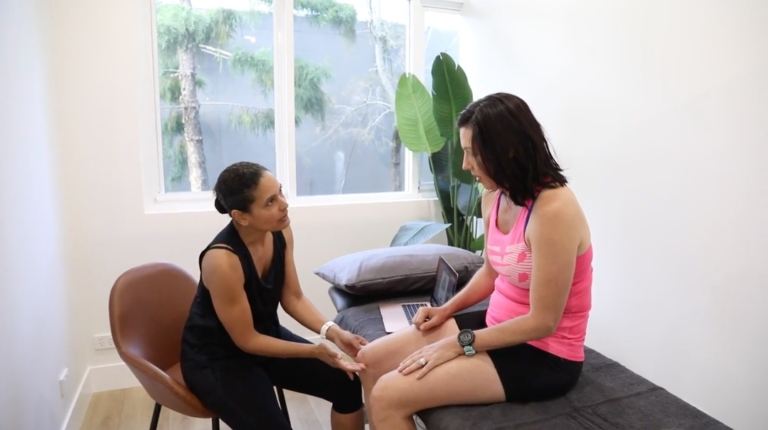Clicking Knee: Cause For Concern?
Most people are used to their joints ‘clicking’ or ‘popping’ every now and then. Though often innocuous, like when you crack your knuckles, these sounds can sometimes be indicative of an underlying tendon, cartilage, muscle, or movement concern1 2.
One region that is particularly prone to these is the knee. There are a variety of issues that can afflict this joint, and many result in a painful ‘pop’ when climbing stairs, squatting, or even just walking.
Thankfully, there are a number of effective, non-invasive treatments that can help manage knee discomfort and painful clicking, as well as restore lost movement and function.

What Is Knee Clicking?
Throughout the medical field, the popping, clicking, cracking, or grating sensation people experience in their joints is referred to as crepitus. It derives its name from the Latin word for ‘rattling’ or ‘creaking’, and can occur in people of all ages and fitness levels. When experienced without pain, this clicking is not usually cause for concern.
Benign cases are often attributed to cavitation – a process in which joints gradually build up nitrogen bubbles. When these bubbles gather in the spaces between bones, it can cause the affected area to feel stiff or tight. ‘Cracking’ the joint releases the pent up nitrogen, which restores movement and prevents further popping until the next accumulation cycle3.
What Causes Painful Knee Clicking?
Osteoarthritis – More common in the elderly (though certainly capable of affecting younger demographics) knee osteoarthritis is a deterioration of the knee cartilage over time. It’s generally thought of as a ‘wear and tear’ issue that slowly increases in intensity, as opposed to one that appears after a single trauma.
Iliotibial Band Syndrome – This occurs when the iliotibial band on the outside of the knee ‘catches’ as the joint bends. It manifests as a snapping feeling on the outside of the knee, and is capable of causing significant inflammation and pain when the individual runs, cycles, or performs other repetitive leg movements5.
Anterior Cruciate Ligament (ACL) and Medial Collateral Ligament (MCL) Injuries – While capable of producing a loud popping sound, these types of injuries usually only do so once, and with trauma to the knee. That’s because the noise is created by a one-off tear to the ligament itself, rather than any repetitive mechanism. Both ACL and MCL injuries result in disabling pain and swelling, as well as buckling of the knee upon use6.
Treatments
Surgery – Recognised as a last resort, keyhole surgery is necessary in some cases to repair any physical damage to the ligaments and cartilage9.
In such an instance, undertaking a suitable post-operative physiotherapy plan is vital to regaining strength, mobility, and functionality in the knee joint and legs10.
What should you do if you experience painful clicking knees?
If you experience recurring and painful clicking or popping knees, it’s important to consult with a qualified health professional. Knee issues can have many causes, so an accurate diagnosis is needed to get you on the correct management plan.
Once diagnosed, reliable and experienced practitioners, like those at E3 Physio, will be able to treat your condition with proven and effective therapies.
At E3, we help patients manage knee pain through a combination of manual treatments including joint mobilisation, stretching, strengthening exercises, and focused shockwave therapy. This multifaceted approach has allowed countless of our clients to overcome knee pain, and return to doing the things they love.
You can reach out to our friendly team via phone, or book an appointment online.
References
- https://www.cedars-sinai.org/blog/ask-a-doc-is-knuckle-cracking-bad.html
- https://orthopedicassociates.org/when-is-joint-popping-a-problem/#:~:text=When%20To%20Tell%20Your%20Doctor,arthritis%2C%20tendinitis%2C%20or%20bursitis
- https://www.mykneedoc.co.uk/why-do-my-knees-click/
- https://www.mayoclinic.org/diseases-conditions/torn-meniscus/symptoms-causes/syc-20354818
- https://www.hss.edu/condition-list_iliotibial-band-syndrome.asp#:~:text=The%20most%20common%20symptom%20of,the%20outside%20of%20the%20knee
- https://www.knee-pain-explained.com/knee-pain-and-popping.html
- https://www.physio-pedia.com/Patellofemoral_Pain_Syndrome
- https://www.ncbi.nlm.nih.gov/pmc/articles/PMC7670564/
- https://www.webmd.com/pain-management/knee-pain/physical-therapy-meniscus-tear#:~:text=The%20PT%20process%20usually%20goes,leg%20raises%20and%20toe%20raises
- https://www.webmd.com/pain-management/knee-pain/physical-therapy-meniscus-tear#:~:text=The%20PT%20process%20usually%20goes,leg%20raises%20and%20toe%20raises

